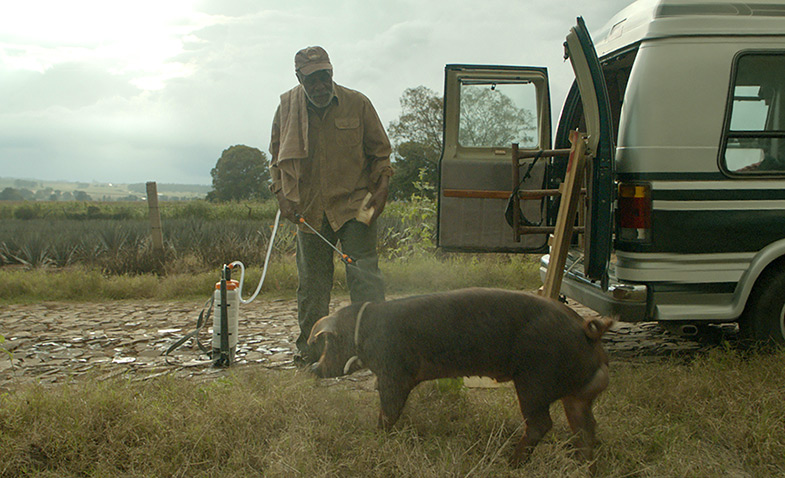 The film opens inside a rustic home, filthy and in disarray. Dirty dishes are stacked a mile high, miscellaneous items are randomly scattered across the room, and a sizable bottle of brown liquor appears mostly empty. A sonically assaultive landline telephone begins to ring, waking up Eubanks (Danny Glover). Delaying as long as he can, he ambles into the kitchen, finally answering the phone. It’s his daughter, Eunice (Maya Rudolph), audibly exasperated as she asks whether he’ll be visiting her and the grandchildren this weekend. Eubanks begins to ramble off reasons why it’s going to be difficult for that to happen. They both know the answer, though. He won’t be there, and within five minutes, it’s clear he never really has been.
The film opens inside a rustic home, filthy and in disarray. Dirty dishes are stacked a mile high, miscellaneous items are randomly scattered across the room, and a sizable bottle of brown liquor appears mostly empty. A sonically assaultive landline telephone begins to ring, waking up Eubanks (Danny Glover). Delaying as long as he can, he ambles into the kitchen, finally answering the phone. It’s his daughter, Eunice (Maya Rudolph), audibly exasperated as she asks whether he’ll be visiting her and the grandchildren this weekend. Eubanks begins to ramble off reasons why it’s going to be difficult for that to happen. They both know the answer, though. He won’t be there, and within five minutes, it’s clear he never really has been.
That guilt, brought on by parental absence, permeates every frame of "Mr. Pig," the latest directorial effort by Diego Luna. And it doesn’t go away. Soon we discover Eubanks is a seasoned pig farmer from Georgia in desperate need of money. Like a bank robber doing one last job before getting out of the game, Eubanks drives down to Mexico where a potential buyer has offered him $50,000 for his last prized pig. Of course, the transaction doesn’t go according to plan. His guiding principle — that these creatures should be treated humanely before being slaughtered — ends up undoing the deal.
There’s something admirable about someone in old age sticking to their moral compass. On all fronts, Eubanks is a troubled man. He’s in massive debt, cutting up credit cards as he shuttles around Mexico. He’s a raging alcoholic, consuming any type of liquor when given the opportunity. And, most tragically, he has cancer. To help her ailing father, Eunice comes down to Mexico in a desperate attempt to save him. From that moment forward, "Mr. Pig" changes its tune from a tale of despondency to a road movie between an estranged father and his daughter.
Although rocky at first, Rudolph and Glover eventually find their footing in the sadness. And it’s all sadness. For nearly two hours, Luna’s third feature offers very few moments of hope or joy. The light at the end of the tunnel withered away long ago. Now all that’s left is this fractured relationship — a daughter searching for her father’s warmth as he slowly begins to depart from this Earth. But the film (and Luna) understand there is no quick fix to familial bonds long-disintegrated. There is only empathy, and, maybe, some unconditional love. For that, "Mr. Pig" warrants praise for refusing to offer up a convenient, unearned reconciliation.
However, in watching the film, it’s hard not to grow tired of its unremitting melancholy. The emotional beats — which include an elderly Eubanks floundering even as Eunice extends a helping hand and understanding ear — grow repetitive and frustrating. Why can’t he see past his own misgivings and accept her affection? Why does it take him so long to admit shame, and to ask for forgiveness? And why, after a lifetime of consumption, can’t he put down the bottle? Perhaps old habits really do die hard.
For what it’s worth, Glover elicits these questions early and often. It’s a performance that could’ve easily been phoned in, replete with cliches and bland characterization. But in this new chapter of his career, Glover seems interested in looking inward, reflecting on the pangs and pleasure of getting old. Glover plays the part of Eubanks as if it’s the story of his life. [B-]
Click here for our complete coverage from the 2016 Sundance Film Festival

